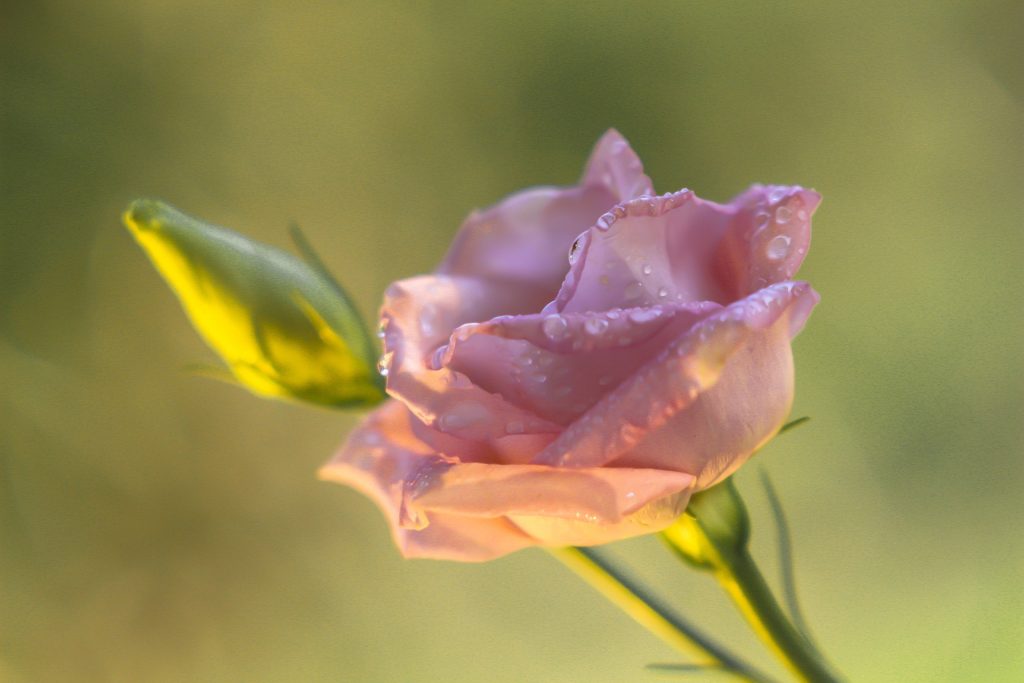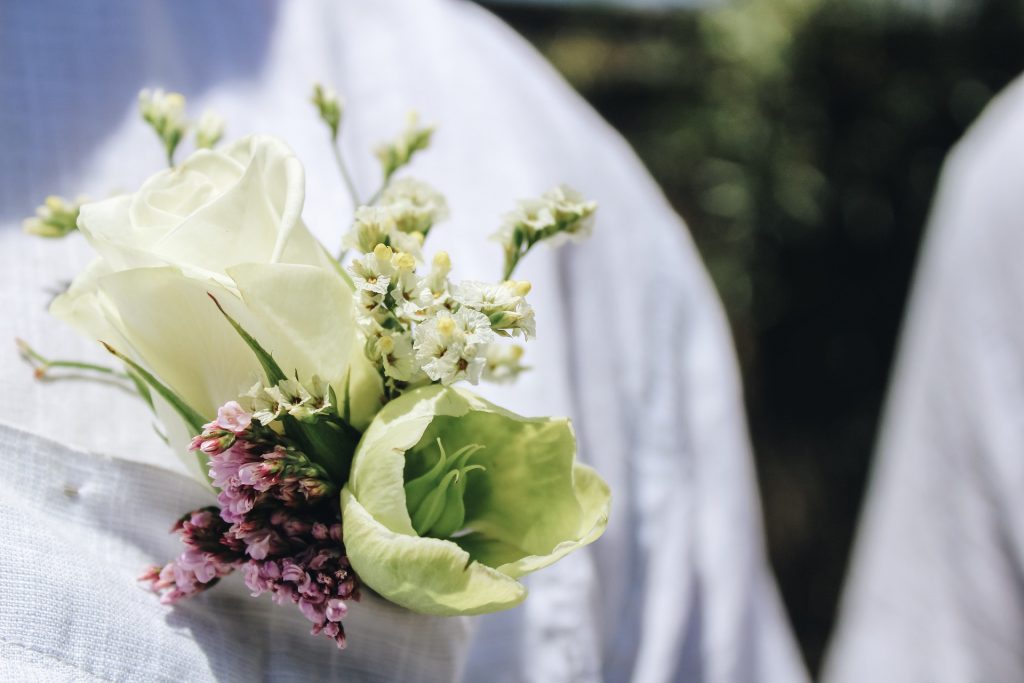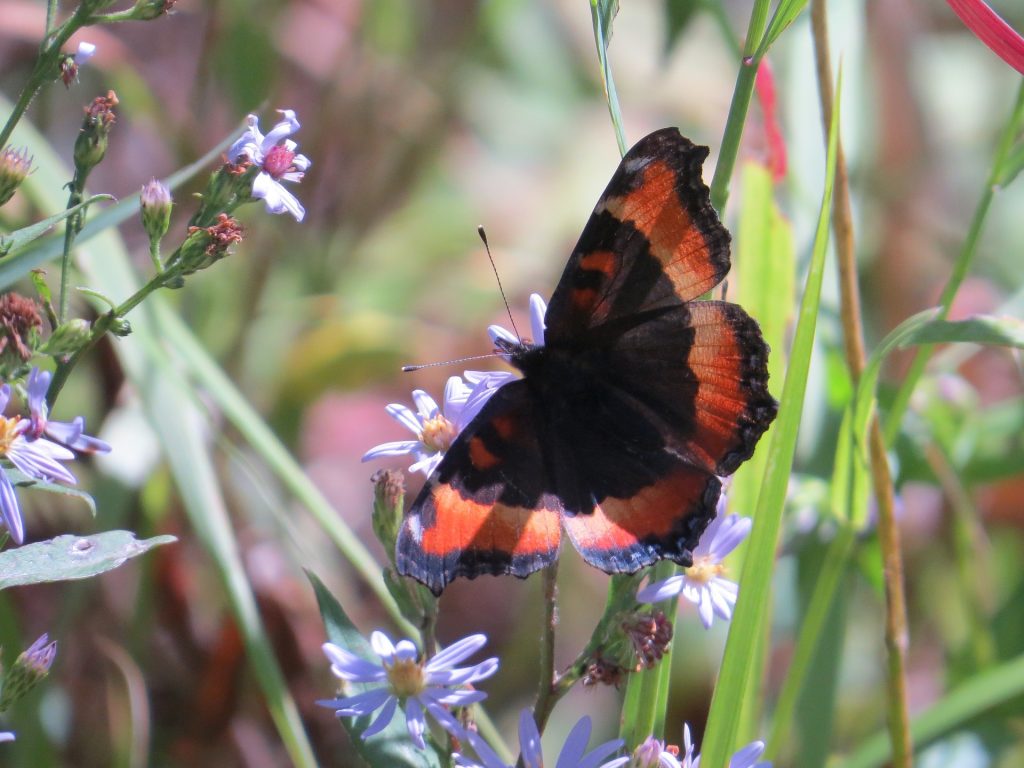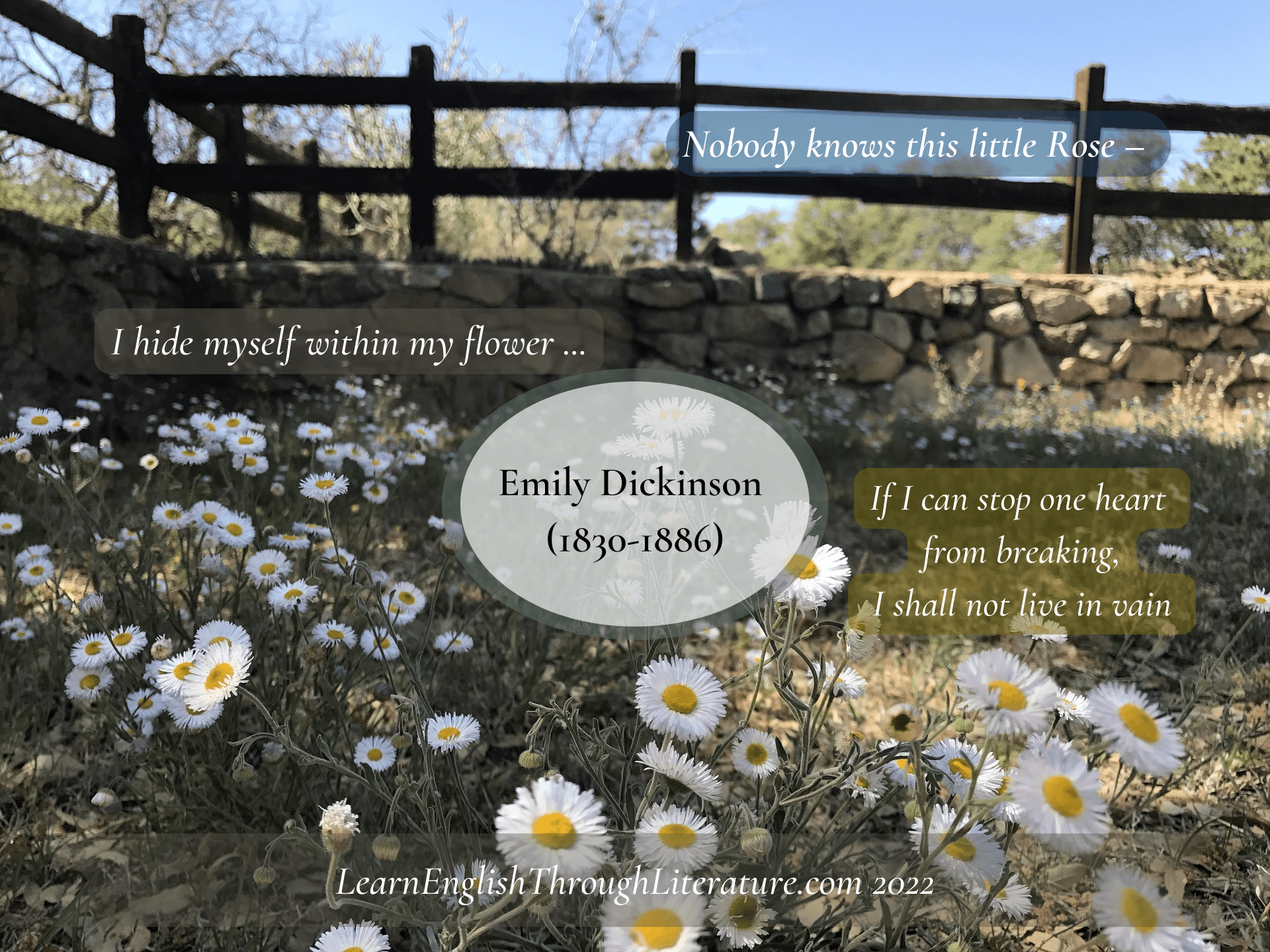If you have been following my Short Lessons for a while, you might remember that every so often I like to return to the poetry of one of my favourite American poets, Emily Dickinson (1830-1886).🌼
My recent lessons have been filled with explanations and thorough guidance.
Today’s lesson will be different because you will have the chance to read and respond to questions on your own, with very little guidance from me. 😊
✅ PART #1: I’ve selected three poems that talk about springtime blossoms and the act of cherishing someone or something precious that may have gone forever.
✅ PART #2: Please peruse the poems while using the vocabulary lists I’ve provided for each, and make an effort to formulate your thoughts in response to the questions posed after each poem.
✅ PART #3: Next, select one question, respond to it in writing, and submit it to me. I would love to see your written response and offer assistance in enhancing your English skills through it.
………..

📗 ‘NOBODY KNOWS THIS LITTLE ROSE’ – BY EMILY DICKINSON
Nobody knows this little Rose –
It might a pilgrim be
Did I not take it from the ways
And lift it up to thee.
Only a Bee will miss it –
Only a Butterfly,
Hastening from far journey –
On its breast to lie –
Only a Bird will wonder –
Only a Breeze will sigh –
Ah Little Rose – how easy
For such as thee to die!
…
📝 VOCABULARY
pilgrim (noun): a person who journeys to a sacred place for religious reasons.
take it from the ways: take something (like a flower, in this case) from the side of the road
lift it up to thee: offer it up to you
hastening (from the verb, ‘to hasten’): hurrying, rushing along
on its breast to lie: to lie on its chest, on its side. In this instance, Emily Dickinson is imagining that the rose has a body, much like a person. The rose has now lost its vitality and isn’t being cherished or valued to its full potential. It would not have been the same if it were still in its natural environment surrounded with the birds, bees, and butterflies that now long for its presence.
sigh: a long, deep breath of air that is breathed out of the body and expresses sadness, relief, tiredness, or something similar.
thee: [archaic or old-fashioned English] you.
…
A QUESTION FOR YOU 🫴
The subject of Dickinson’s poem is the fragility or the frailty of the important things in life. Additionally, her poem delves into the swift passage of time or the fleeting seasons in nature during which a rose can bloom, be plucked, and wither away.
🗝️ The rose can also be seen as a symbol of something else.
If you had to choose a symbol to represent something or someone that is important to you, but also vulnerable, who or what would it be?
………..

📗 ‘WITH A FLOWER’ – BY EMILY DICKINSON
I hide myself within my flower,
That wearing on your breast,
You, unsuspecting, wear me too —
And angels know the rest.
I hide myself within my flower,
That, fading from your vase,
You, unsuspecting, feel for me
Almost a loneliness.
…
📝 VOCABULARY
unsuspecting (adjective): (describing a person or animal) not aware of the presence of danger; feeling no suspicion; off guard or ignorant
angels (noun): spiritual beings acting as servants or messengers of God. They are often represented in art as having a human form with wings and a long robe or dress.
fading (from the verb, ‘to fade): to gradually grow faint and disappear from sight
loneliness (noun): sadness because one has no friends or company; (of a place) the quality of being unfrequented and remote; isolation
almost a loneliness: something like a feeling of loneliness
…
A QUESTION FOR YOU ✍️
In this poem, the experience of becoming a flower that bears the essence of the giver — the sense of their character or presence truly being present. The flower can convey the love and gratitude of the giver in the same way.
If this were possible, the recipient of the flower — the person referred to as “you” in the poem — would experience some sort of loneliness as the flower withered and perished.
The giver — perhaps Emily Dickinson herself, who was a truly reserved person — talks of “hiding” inside the flower, as though she is too ashamed to express her emotions out loud but still desires to share them.
🫴 Have you ever given someone a gift that was truly from the heart? If yes, what did you give and what message did you hope the gift would convey to the recipient? Additionally, what emotions did you feel when you gave it — love, excitement, hopefulness, or gratitude? 💝
………..

📗 ‘I SHALL NOT LIVE IN VAIN’ – BY EMILY DICKINSON
If I can stop one heart
from breaking,
I shall not live in vain;
If I can ease one life the aching,
Or cool one pain,
Or help one fainting robin
Unto his nest again,
I shall not live in vain.
…
📝 VOCABULARY
one heart / from breaking: We use this expression of ‘breaking a heart’ or ‘being heartbroken’ or ‘going through a heartbreak’ in a symbolic way, of course. It means to experience the deep pain of losing someone you love, either through rejection or because of a loss like death. Here Dickinson is saying that she feels her life would be worthwhile if she can protect one person from going through such pain.
ease (verb): to make something painful or difficult much easier or more bearable.
aching (noun, from the verb ‘to ache’): an ongoing physical pain, or the pain that comes from intense sorrow or longing.
cool one pain: help to comfort someone’s pain as if with a cooling or cold cloth (as when they have a temperature); to ease and lessen their grief or sorrow.
fainting: tending to lose consciousness for a short time, tending to become suddenly weak or feeble
unto his nest again: into his nest again
in vain: without a purpose; worthlessly
…
A QUESTION FOR YOU 🤔
In life, there are often occasions when we sense our ability to assist others is quite limited.
🫴 Have you ever gone through such experiences? and how did you overcome them?
🫴 How did you offer your support to those you wanted to help (for instance, by offering comfort, listening to them, preparing food for them, or providing some other kind of support)?
………..
💐 CONCLUDING THOUGHTS
These three short poems demonstrate Emily Dickinson’s kind-hearted, sensitive, and observant personality!
🌼
I always feel that her poems encourage me to become a better person.




